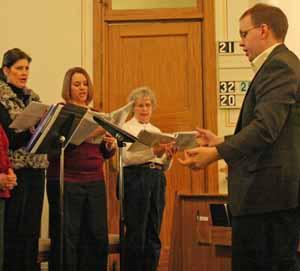By Anne Marie Amacher

DAVENPORT — When he was a kindergartner, Jacob Bancks began writing music. In second grade he began playing music in church. “I can’t remember a time I didn’t want to be a composer,” Bancks said.
A recent transplant to the Quad-City area, Bancks teaches music theory and composition at Augustana College in Rock Island, Ill., and recently became director of music at St. Paul the Apostle Parish in Davenport.
During his “spare time” prior to his move from Chicago, he wrote a Mass setting for the new Roman Missal that is being used at St. Paul’s as well as other Catholic parishes across the United States.
He said he wrote the Mass setting after a priest suggested it would be a good opportunity with implementation of the new Roman Missal — which began Nov. 27.
Bancks was honored by Cardinal Francis George of Chicago for his composition of the Mass of the Most Sacred Heart Dec. 3 in Chicago.
“There are a number of gifted church music composers who have begun distributing their music independently online, so I knew there was a potential audience,” Bancks said. “I haven’t been disappointed.”
He gets emails from priests and music directors at parishes large and small, Newman Catholic student centers in the United States and England, and from other people who have found his setting online, for free, and have used it successfully. “I think with the Internet, people are happy to have a much wider range of options for choosing music than perhaps they’ve had in the past.”
Deacon Frank Agnoli, director of liturgy for the Diocese of Davenport, said he received an email from Bancks that he was coming to the diocese and wanted to meet. “He mentioned he wrote a Mass setting.”
Once Bancks got settled, Deacon Agnoli met with him. At the time, Deacon Agnoli was working with Deacon Corey Close on preparations for his ordination to the priesthood next summer. The two decided to use Bancks’ Mass setting for the ordination Mass. Deacon Agnoli noted that Bancks volunteered to lead the diocesan choir for the ordination Mass as well.
Bancks has offered a chant workshop at St. Paul’s and worked with priests on singing the new Mass parts. Bancks even worked with Bishop Martin Amos.
The bishop said Bancks “graciously came to my house since I was still in rehab at home (from knee replacement surgery). He helped me sing texts of the new missal. But what really helped was explaining to me how to ‘point’ the texts myself. He also gave me some great pointers on breathing and singing.”
Love of music has been a constant in Bancks’ life.
He said he played violin in a youth symphony, then viola in his college orchestra. “I was always a choral accompanist, but I didn’t really learn much about singing until well into graduate schools. I still feel like I have much to learn about the human voice.”
Bancks said he grew up playing piano in church and as a child had a strong appreciation for four-part hymnody. Regarding sacred music, he said he never had a “complete grasp” of it until much later. And later on it had a “tremendous impact on me.”
He earned a Bachelor of Music in composition from Wheaton College, a Master of Music in composition from Eastman School of Music in Rochester, N.Y., and is currently completing his Ph.D. in music composition from the University of Chicago. He expects to defend his dissertation in February.
While studying in Chicago, Bancks took on the musical director post at St. John Berchmans Parish. Although he was not Catholic at the time, Bancks said it’s quite common for musicians to work in churches of denominations different than theirs. “I heard about the job from my landlord who was a longtime parishioner at the church.” He said the landlord knew he was a musician, but didn’t know his faith background.
Bancks wrote some religious music before he was at the parish, but “Honestly, even before I understood Catholic music, I have always felt that we already had enough songs and hymns, so I never gave much thought to writing my own. The actual texts of the Roman Rite are what I find most inspiring.”
While at the Chicago-area parish, Bancks and his wife, Kara, converted to Catholicism during the Easter Vigil Mass in 2010. Their daughter Hannah Rose, now 2, was baptized. The couple also has a son, John Isaac, who is 1. Bancks’ wife also is a professional musician.
Writing the various parts for the new Roman Missal setting went rather quickly, Bancks noted. “I’m used to writing for symphony orchestras and professional musicians, so the limits of writing for a congregation made this task go significantly quicker.
“The major challenge in the congregational music is to write music that is both accessible and beautiful. Much of what we already have is certainly easy, but sometimes I think we come up short in beauty.”
One challenge Bancks set for himself was to write the melodies that would work with both English and Latin texts. “This wasn’t easy, but it ended up working well.”
To hear music by Bancks, visit his website at www.jbancks.com.








